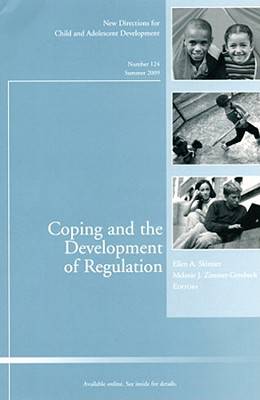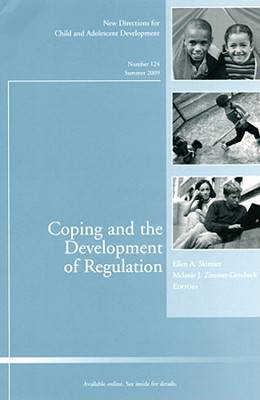
- Retrait gratuit dans votre magasin Club
- 7.000.000 titres dans notre catalogue
- Payer en toute sécurité
- Toujours un magasin près de chez vous
- Retrait gratuit dans votre magasin Club
- 7.000.0000 titres dans notre catalogue
- Payer en toute sécurité
- Toujours un magasin près de chez vous
Coping and the Development of Regulation
New Directions for Child and Adolescent Development, Number 124
Cad, Skinner, Zimmer-GembeckDescription
The volume is geared toward researchers working in the broad areas of regulation, coping, stress, adversity, and resilience. For regulation researchers, it offers opportunities to focus on age-graded changes in how these processes function under stress and to consider multiple targets of regulation simultaneously--emotion, attention, behavior--that typically are examined in isolation. For researchers interested in coping, this volume offers invigorating theoretical and operational ideas. For researchers studying stress, adversity, and resilience, this volume highlights coping as one pathway through which exposure to adversity shapes children's long-term development.
The authors also address cross-cutting developmental themes, such as the role of stress, coping, and social relationships in the successive integration of regulatory subsystems, the emergence of autonomous regulation, and the progressive construction of the kinds of regulatory resources and routines that allow flexible constructive coping under successively higher levels of stress and adversity. All chapters emphasize the importance of integrative multilevel perspectives in bringing together work on the neurobiology of stress, temperament, attachment, regulation, personal resources, relationships, stress exposure, and social contexts in studying processes of coping, adversity, and resilience.
This is the 124th volume of the Jossey-Bass quarterly report series New Directions for Child and Adolescent Development. The mission of New Directions for Child and Adolescent Development is to provide scientific and scholarly presentations on cutting edge issues and concepts in the field of child and adolescent development. Each volume focuses on a specific "new direction" or research topic, and is edited by an expert or experts on that topic.
Spécifications
Parties prenantes
- Auteur(s) :
- Editeur:
Contenu
- Nombre de pages :
- 108
- Langue:
- Anglais
- Collection :
- Tome:
- n° 124
Caractéristiques
- EAN:
- 9780470531372
- Date de parution :
- 19-06-09
- Format:
- Livre broché
- Format numérique:
- Trade paperback (VS)
- Dimensions :
- 147 mm x 226 mm
- Poids :
- 158 g

Les avis
Nous publions uniquement les avis qui respectent les conditions requises. Consultez nos conditions pour les avis.






